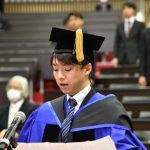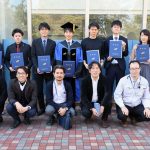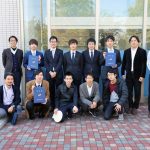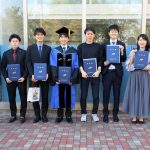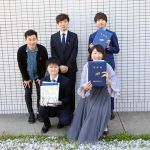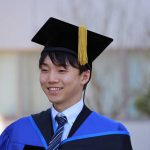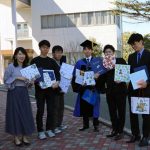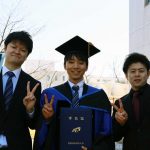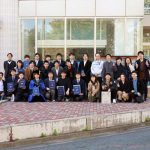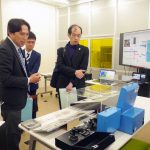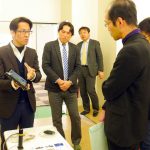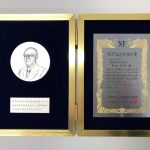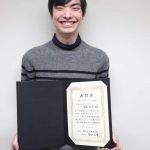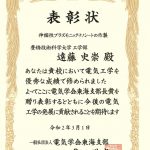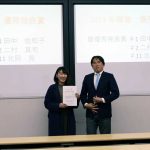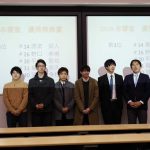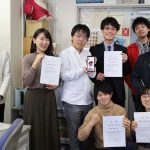The 81st JSAP Autumn Meeting 2020
2020/09/08 Conference
The 81st JSAP Autumn Meeting 2020
Event period: September 8(Tue.)-11(Fri.),2020
Online Virtual Meeting
Presentation of research results.
<Oral>
- Hayato Muraguchi, Hideo Doi, Hirotaka Shiguma, Tomoko Horio, Kazuhiro Takahashi, Toshihiko Noda, Kazuaki Sawada,
Fabrication of multimodal image sensor that can visualize lactic acid distribution and hydrogen ion distribution simultaneously, 8p-Z12-1, 11-041, 2020.9.8 - Koutarou Sakamoto, Shunki Sugimoto, Tomoko Horio, Kazuhiro Takahashi, Toshihiko Noda, Kazuaki Sawada,
Fabrication of Potassium Ion Image Sensor Using Sol-Gel Glass Sensitive Film with CMOS Process Compatibility, 8p-Z12-3, 11-043, 2020.9.8 - Toshiaki Takahashi, Hiroyuki Ohta, Toshinobu Fujieda, Kazuaki Sawada, Kazuhiro Takahashi,
Fabrication of MEMS Optical Interference Surface Stress Sensor by Molecular Imprinting Method for Detection of Unlabeled Neurotransmitter, 8p-Z12-12,11-053, 2020.9.8
2020 IEEJ Sensors and Micromachines Division General Meeting
2020/07/06 Conference
We presented our research results at the 2020 IEEJ Sensors and Micromachines Division General Meeting on Bio and Microsystems. The event was held online.
<Oral>
- Yuto Honda, Sawako Tanaka, Yong joon Choi, Toshihiko Noda, Kazuhiro Takahashi, Kazuaki Sawada, Hitoshi Ishii (Toyohashi University of Technology), Katsuyuki Machida, Hiroyuki Ito (Tokyo Institute of Technology), Yasuhiko Nikaido, Mitsumasa Saito (University of Occupational and Environmental Health), Shinichi Yoshida (Fukuoka Megumi Hospital),
Investigation of the identification method of Legionella spp. by photo-gated fluorescent sensor, BMS-20-024, 2020.7.6 - Shin Kitane, Kazuaki Sawada, ○Kazuhiro Takahashi
Highly sensitive mass measurement by receptor-modified graphene resonance sensor, BMS-20-025, 2020.7.6
Mr. Kumagai’s paper has been published online.
2020/05/15 publication
Mr. Kumagai’s paper has been published online.
Title: Stretchable and High‐Adhesive Plasmonic Metasheet Using Al Subwavelength Grating Embedded in an Elastomer Nanosheet
Author: Hayato Kumagai, Toshinori Fujie, Kazuaki Sawada, Kazuhiro Takahashi
Journal: Advanced Optical Materials, https://doi.org/10.1002/adom.201902074
A paper on graphene surface stress biosensors has been published online.
2020/03/27 publication
A paper on graphene surface stress biosensors has been published online.
This paper is open access.
Title: A suspended graphene-based optical interferometric surface stress sensor for selective biomolecular detection
Autho: Shin Kidane, Hayato Ishida, Kazuaki Sawada and Kazuhiro Takahashi
Journal: Nanoscale Advances, Issue4, DOI: 10.1039/C9NA00788A
https://pubs.rsc.org/en/content/articlelanding/2020/na/c9na00788a
The 2019 Graduate School Graduation and Undergraduate Graduation Ceremonies were held.
2020/03/23 InformationTopix
This year, in consideration of the spread of the COVID‑19, the ceremony was held on campus with a small number of graduates of the doctoral course, representatives of each department, and representatives of each course.
Visit from Deputy Director-General of the Minister’s Secretariat, Ministry of Economy, Trade and Industry (in charge of Industrial Science and Technology Policy and Environment Bureau)
2020/03/12 InformationTopix
2020/3/12 Mr. Watanabe, Deputy Director-General, Industrial Science and Technology Policy and Environment Bureau, Ministry of Economy, Trade and Industry, and Mr. Baba, Office for Promotion of University Collaboration, Technology Promotion and University Collaboration Promotion Division, Industrial Science and Technology Policy and Environment Bureau, visited our group and observed our research.
A paper on in-vivo sensors has been published in EurekAlert!
2020/03/07 publicationTopix
2020/3/7 A paper on in-vivo sensors has been published in EurekAlert!
It was also introduced in Medicalxpress and Bioengineer.
https://medicalxpress.com/news/2020-03-acids-bases-ph-brain.html
Prof. Sawada won the 37th Nagai Technology Award.
2020/03/03 Awards
2020/3/3 Prof. Sawada won the 37th Nagai Technology Award.
Title: Development of a Chemical Imaging System Using Semiconductor Sensors
Organizer: Nagai Foundation for Science and Technology
Mr. Fumitaka Endo (B4) won the IEEJ Tokai Section Chief Award.
2020/03/01 AwardsInformation
2020/3/1 Mr. Fumitaka Endo won the IEEJ Tokai Branch Award.
Title: Fabrication of Stretchable Plasmonic Nanosheets
M2 Master’s Thesis Final Examination was held.
2020/02/21 Topix
2020/2/20-21 M2 Master’s Thesis Final Examination was held.
The following members of our group were awarded for their outstanding dissertations.
Best Presentation Award Ms. Sawako Tanaka
Best Presentation Award Mr. Hirotaka Shiguma
Excellent Presentation Award Mr. Atsuya Hirata
I would like to express my appreciation to all the M2 students for their hard work.
Thank you very much for your hard work.

